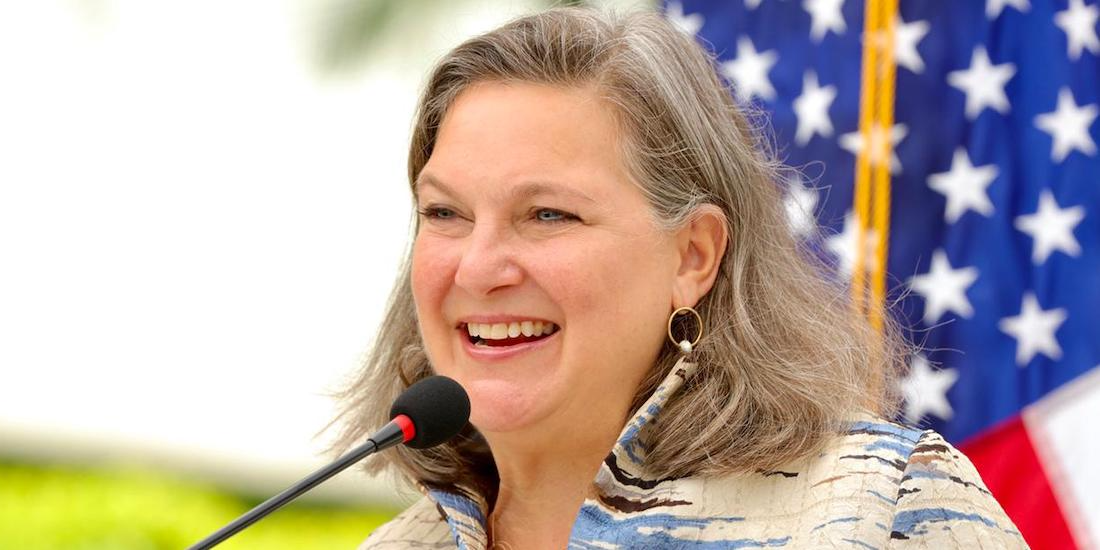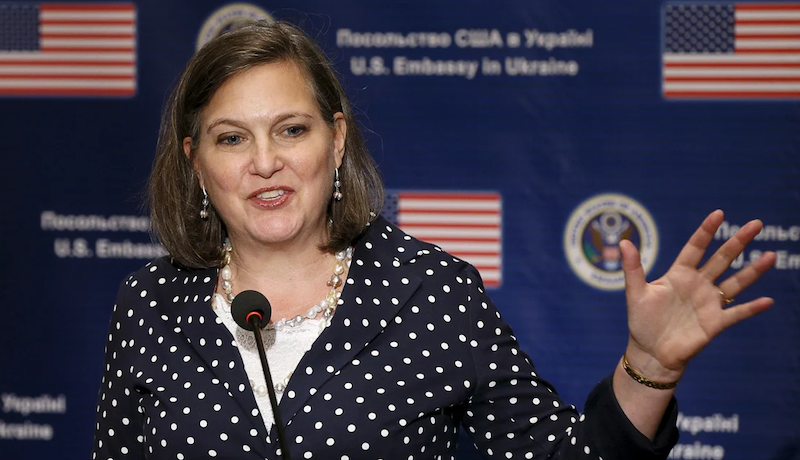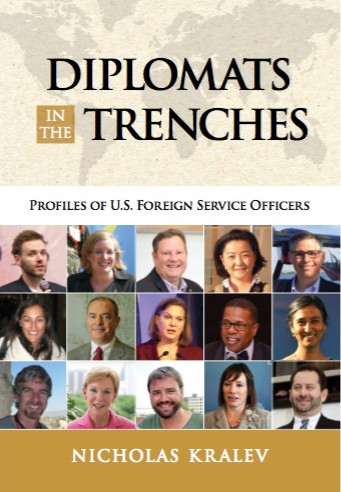
The Unconventional Diplomatic Career of Victoria Nuland
After a four-year absence, the 32-year Foreign Service veteran is about to return to the State Department as its highest-ranking career official.
By NICHOLAS KRALEV | FEBRUARY 14, 2021

Victoria Nuland wasn’t necessarily looking for love when she joined the Foreign Service in 1984, but she found it anyway ― fairly quickly and not too far away. While working on the China desk at the State Department, she started dating a young speechwriter for then-Secretary of State George Shultz. When they got married three years later, the inevitable question arose: What would her husband, Robert Kagan, do while his diplomat-wife served abroad? He didn’t think that joining the Foreign Service himself would be the best solution, and he really wanted to write. So that was what he did.
“He wrote his first book, on Nicaragua, in the spare bedroom of our Moscow apartment,” recalled Nuland, who was a political officer at the U.S. Embassy in Russia from 1991 until 1993. “The KGB used to rifle his office regularly ― we could tell by the lingering stench of cigarettes and body odor. They couldn’t fathom that he was really just a writer.”
Since then, Nuland has built a career that is the envy of many American diplomats. She was the first female ambassador to NATO, beginning in 2005, and became assistant secretary of state for European and Eurasian affairs in 2013 ― most of her colleagues never get to be ambassadors, let alone assistant secretaries. She retired from government service in 2017, but yesterday, President Biden nominated her to be undersecretary of state for political affairs, the State Department’s highest-ranking career official.

Ambassador Victoria Nuland during a press conference at the U.S. Embassy in Ukraine in 2013. Photo by U.S. Mission Ukraine.
In an interview before her retirement, Nuland told me she was most proud of having achieved a balance of sorts between her work and personal life ― raising a family and keeping a spouse happy. She attributed it to “lots of luck, great mentors and a heavy dose of bending the Foreign Service to be more modern” and accommodating. “I married a very flexible, portable guy who was willing to make huge sacrifices in his own career to make mine possible, and who had generous bosses,” she said.
After more than three decades in the Foreign Service, Nuland said that today’s global challenges require American diplomats to be “agents of change” and to effectively get specific things done in multicultural environments, working not only with governments, but also with NGOs, the private sector and even individual citizens in foreign countries. “Diplomacy is not only about government to government anymore, but also human to human,” she said. “What we try to do, and get other countries to do, is empower people. American diplomacy is increasingly done from the bottom up. We recognize that, with the craving for democracy and freedom of expression, with the Internet and social media, countries are changing as much from the bottom up as they are from the top down. So we need to know those people and be connected to them.”
 For decades, U.S. diplomats in the Middle East were used to “working with kings, sultans and presidents for life,” Nuland said. “But they didn’t know much about the people in those countries. They didn’t know how to promote democracy or manage economic support funds. Then we had the revolutions in Tunisia, Libya, Egypt and Syria. So those officers have had to change and learn new skills, because we need transformational folks.”
For decades, U.S. diplomats in the Middle East were used to “working with kings, sultans and presidents for life,” Nuland said. “But they didn’t know much about the people in those countries. They didn’t know how to promote democracy or manage economic support funds. Then we had the revolutions in Tunisia, Libya, Egypt and Syria. So those officers have had to change and learn new skills, because we need transformational folks.”
As assistant secretary for Europe in the Obama administration, Nuland was criticized for being too much of an activist in pushing for stronger support for Ukraine’s pro-democracy movement and standing up to Russian activities in the former Soviet republic. Washington’s frustrations with the more hesitant and indecisive European Union were laid bare in a leaked 2014 phone conversation between Nuland and the U.S. ambassador in Kyiv at the time, Geoffrey Pyatt, in which she disparaged the EU, using a well-known four-letter expletive. U.S. officials suggested that the call had been bugged by the Russians.
Despite the embarrassment that episode caused, Nuland didn’t lose the confidence of her bosses. In fact, she has enjoyed the trust and support of the country’s top political leaders from both parties for decades and has been rewarded with senior positions by both Republicans and Democrats. During the George W. Bush administration, she was an adviser to Vice President Dick Cheney. During Obama’s first term, then-Secretary of State Hillary Clinton’s decision to appoint her the State Department spokesperson surprised many, but Nuland had been valued by Democrats before ― in the Clinton administration, she was chief of staff to Deputy Secretary of State Strobe Talbott.
So how can the same person champion the policies of Bush and Cheney, and a few years later do the same with Obama and Clinton’s policies? “My fundamental starting point is that everybody in these top jobs, whether Cheney or Clinton, has a single common thread, which is that they love their country, and fundamentally what they want is to do what’s best for America,” Nuland said. “Then you have to be willing to politely challenge assumptions that you think are wrong. However, once you’ve made your case, and if they choose to move forward in a different direction, your job is to implement what they chose to do, or to say that you can’t and you’d like to be somewhere else.”
When the Bush administration launched a unilateral attack on Taliban-ruled Afghanistan shortly after 9/11, Nuland was deputy chief of the U.S. Mission to NATO in Brussels. She and her boss, Ambassador Nicholas Burns, thought that getting other countries to join the U.S. operation would bring long-term benefits in the global fight against terrorism. But the powers in Washington weren’t interested. “We spent four or five months saying to the White House, ‘We get it, you don’t want allies at the front of the spear, but they can help hold the spear, and here’s how.’ They ignored us, ignored us, ignored us, and then finally started saying, ‘All right, we’ll do some of this.’ We felt that we opened their eyes to the possibility of getting the allies on board,” Nuland recalled. Eventually, dozens of countries joined the international forces in Afghanistan.
While Nuland was climbing the Foreign Service ladder, her husband wasn’t doing too badly, either. During that first NATO assignment, Kagan followed her to Brussels, where he helped to take care of their two children and began writing another book. That book, “Of Paradise and Power,” was his first bestseller and established him as a leading thinker and writer on foreign affairs. “He reminded me that he wrote it as a direct result of coming to Europe with me,” Nuland said. “More broadly, he credits Foreign Service spousehood with deepening his global education.”
The State Department has become more flexible and accommodating in recent years when it comes to the needs of Foreign Service families, she noted. “In 1998, when I asked for my second maternity leave in 18 months, the human resources folks looked at me like I had two heads ― and then said yes,” she said. “Now it’s routine for mothers and fathers to be granted generous leave without pay or telecommuting options for each kid, or if a parent or partner needs them.” Paid parental leave didn’t become a reality until 2020, when a new law came into effect, providing for up to 12 weeks to certain federal employees.
Although Kagan, who is a senior fellow at the Brookings Institution, has given up a lot to follow her overseas, Nuland said she has had to make some sacrifices, too. “I’ve spent two-thirds of my career in Washington to accommodate Bob and the kids, including turning down the first two ambassadorships I was offered in the late 1990s, because they didn’t work for the family,” she said. Her children wanted to attend high school in the United States, so during those years she took herself “out of the ambassadorial sweepstakes again, including for some very interesting posts,” she added.
“I love the job ― it’s all I’ve ever wanted to do ― but I love my husband and kids more,” Nuland said. “We’ve always made all our decisions together.”
Nicholas Kralev, the executive director of the Washington International Diplomatic Academy, is the author of “America’s Other Army: The U.S. Foreign Service and 21st-Century Diplomacy.”
This article is an excerpt from his book “Diplomats in the Trenches: Profiles of U.S. Foreign Service Officers.”
